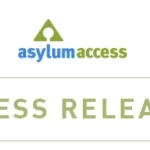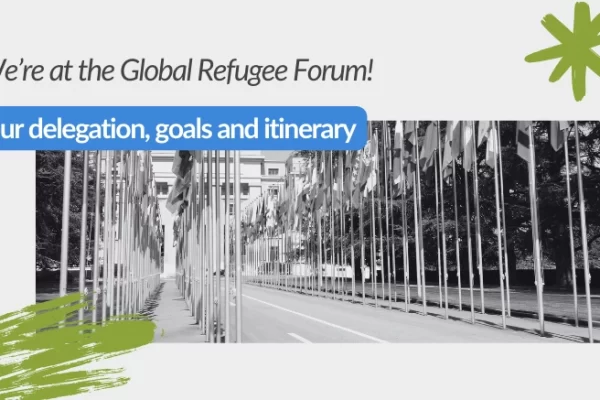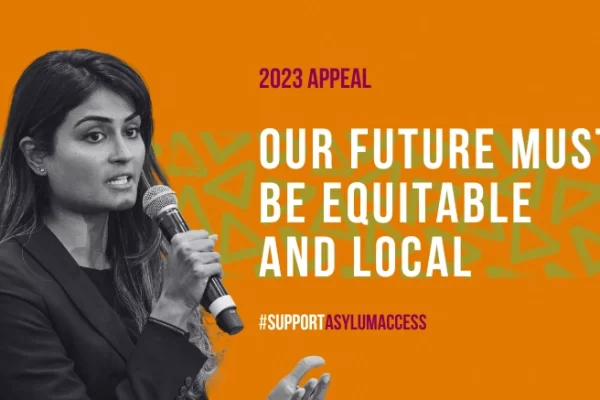A call upon the governments of the region to respond to the displacements from Central America following domestic and international law
This press release is also available in Spanish here.
STATEMENT
Regarding the reports of the departure of migrants in a caravan from Central America, the undersigned organizations call upon the governments of El Salvador, Guatemala, Honduras, Mexico and the United States, to ensure that their response to this population is in strict compliance with human rights and guarantee the possibility to seek asylum for all persons who flee violence and persecution in their countries of origin, or flee as a result of the conditions caused by the environmental and social impact of the hurricanes in CentralAmerica.
The situation of extreme financial vulnerability faced by a large portion of the population in Central America expanded and deepened considerably in the last year as a result of the economic crisis caused by the COVID-19 pandemic, in addition to the destruction caused by the Eta and Iota hurricanes. Furthermore, the population of Central American countries is exposed to a widespread climate of violence and growing State repression. In addition, there are important challenges in terms of sexual and gender violence, abuse and discrimination against indigenous communities, and prevention of crimes and administration of justice due to the institutional weakness and corruption problems. Given this situation, the people who leave CentralAmerica have international protection needs that the governments of the region have an obligation to address, based on domestic and international law.
Since the beginning of the Remain in Mexico Program in January 2019, followed by the migration agreement between Mexico and the United States in June 2019, as well as the United States’ Asylum CooperationAgreements with Honduras, El Salvador and Guatemala, our organizations have noted with great concern a series of policies and actions of the governments of the region that jeopardize the safety, welfare and life of the migrant population, as well as limit the possibility to seek international protection. We are concerned the announcements made up to this point by the governments, both individually (Mexico, Guatemala and the United States) and jointly (communiqués January 11 and January 13), regarding their response to caravans or Central American exodus. Even though the need to respond in compliance with human rights is recognized inall these communiqués, the specific actions and the message that they send is one of contention,dissuasion and criminalization.
We are worried that in their response to this caravan, the governments will base their actions on the strategies that they followed last year, despite international organizations such as the Inter-American Commission on Human Rights having expressed concerns about these actions. We are particularly worried that the governments will fail to take specific actions to prevent refoulment and to address humanitarian needs with a differentiated approach that takes into account gender, age and travel conditions.
We reiterate our concern regarding the role of the armed forces, including the Mexican National Guard, in the detention of migrants, since they are military bodies that lack training on care to vulnerable populations. We stress that the first recommendation issued by the Mexican National Commission on Human Rights (CNDH) to the National Guard addressed its actions in response to the migrant caravan of January 2020. In this recommendation, the CNDH stated that the Mexican National Migration Institute (INM) violated the rights of the victims by allowing the National Guard to verify the migratory status of migrants and to detain them. Moreover, it found that the National Guard had used arbitrary and disproportional force against migrants and that both authorities failed to safeguard the rights of the children traveling in the caravan.
The Inter-American Commission on Human Rights also noted “worrying episodes of use of force by the National Guard” in its response to the caravan. Furthermore, the governments of Guatemala and Honduras have used various police and military forces to dissuade and contain migratory flows, without applying protocols to identify protection needs and without using a differentiated approach that takes into account gender, age and travel conditions.
We are concerned about the “state of prevention” measures issued by the Government of Guatemala for the departments of lzabal, Zacapa, Chiquimula, Jutiapa, El Progreso, Petén and Santa Rosa. We also find it worrying that the governments of Guatemala and Honduras condition the departure of minors on that they are accompanied by both parents, as well as the “curfew” announced by the Government of Honduras, which is a measure that has been used to prevent persons from leaving their country, a right codified in Article 13 of the Universal Declaration of Human Rights.
In the context of the most recent caravans of the Central American exodus at the end of 2020, we were alarmed to see that, instead of implementing sanitary measures to guarantee the right to seek asylum in Mexico, Mexico’s INM issued a communiqué warning of the possibility of “charges of 5 to 10 years of imprisonment for those who expose another to risk of infection”. These measures are contrary to the legal considerations issued by the United Nations High Commissioner for Refugees (UNHCR) in March 2020 regarding the access to territory for persons in need of international protection in the context of COVID-19. These guidelines recognize that States can implement measures such as health screening prior to entry and/or quarantine but emphasize that “such measures may not result in denying them an effective opportunity to seek asylum or result in refoulement”.
Although the United States is still the destination of many migrants who already have support networks in this country and feel there is where their lives and integrity would be safest, it is important to stress that Mexico has increasingly become a destination country. By taking the important decision not to close its borders to persons seeking protection during the pandemic, Mexico received 41,329 asylum petitions in 2020, while over 100,000 persons applied for asylum in Mexico during the two previous years. Even though the United States President-elect Joe Biden has committed to restoring the right to seek asylum on the border with Mexico and to receive 125,000 refugees this fiscal year, this commitment does not absolve Mexico from its obligation to offer asylum to the persons who seek it in the country. In order to do so, the Mexican government must strengthen the Mexican Commission for Refugee Assistance’s (COMAR) capacity and develop policies for the integration of refugees in the country.
We recognize the importance of the incoming Government of the United States having shown a strong commitment to migrants and asylum seekers, which presents an opportunity for the governments of Mexico and Central America to develop policies and migration management that respect and promote the human rights of the population in mobility. We will advocate that the Biden government honors its commitments. A new United States Government is an opportunity to work with the Mexican Government to develop a cooperation plan with Central America to address the causes of migration, together with civil society organizations, as well as an opportunity to increase regional cooperation regarding the persons in need of protection, and to dismantle illegal and inhuman programs such as Remain in Mexico, the United States’Asylum Cooperation Agreements with El Salvador, Guatemala and Honduras, as well as the Title 42 expulsions by the United States authorities.
Consequently, we call upon each government of the region to ensure that the response to possible caravans from Central America, as well as the cooperation established between the countries:
- Guarantee the right to seek asylum in the country chosen by the person as a safe destination.
- Include assessments of protection needs, to ensure the principle of non-refoulement of persons to a country where their lives and fundamental freedoms are at risk.
- Address humanitarian needs in accordance with biosecurity protocols to avoid the spread of COVID-19, as well as to include the migrant population and those who assist them in the preventive measures and health care in this context.
- Implement informative campaigns to ensure that the persons know their rights.
- Refrain from detaining asylum seekers and comply with the Mexican legislation that prohibits the detention of unaccompanied and accompanied children and adolescents.
- Ensure that the States’ responses actively involve the competent authorities on refugees, health, protection of the rights of children and other bodies responsible for the wellbeing and rights of vulnerable groups in the design and implementation of any measure.
- Promote and guarantee the accountability of migration officials and other elements deployed for immigration enforcement actions in case of crimes or human rights violations against migrants and persons seeking international protection, as well as of those who defend their rights.
- Withdraw military elements from immigration enforcement and verification actions, including theNational Guard in Mexico, and ensure that these actions are carried out by civil authorities.
- Ensure that all persons who have valid documents showing that they applied for asylum in the United States under the Remain in Mexico Program can travel freely and safely to the port of entry where they need to follow their immigration proceedings.
Endorsements
A full list of endorsements by civil society organizations, civil society networks, and individuals is available in the published version of this press release, which can be viewed here (PDF).
More information:
Miriam González Sánchez
Instituto para las Mujeres en la Migración, AC
Cel. +52 55 3733.5819





